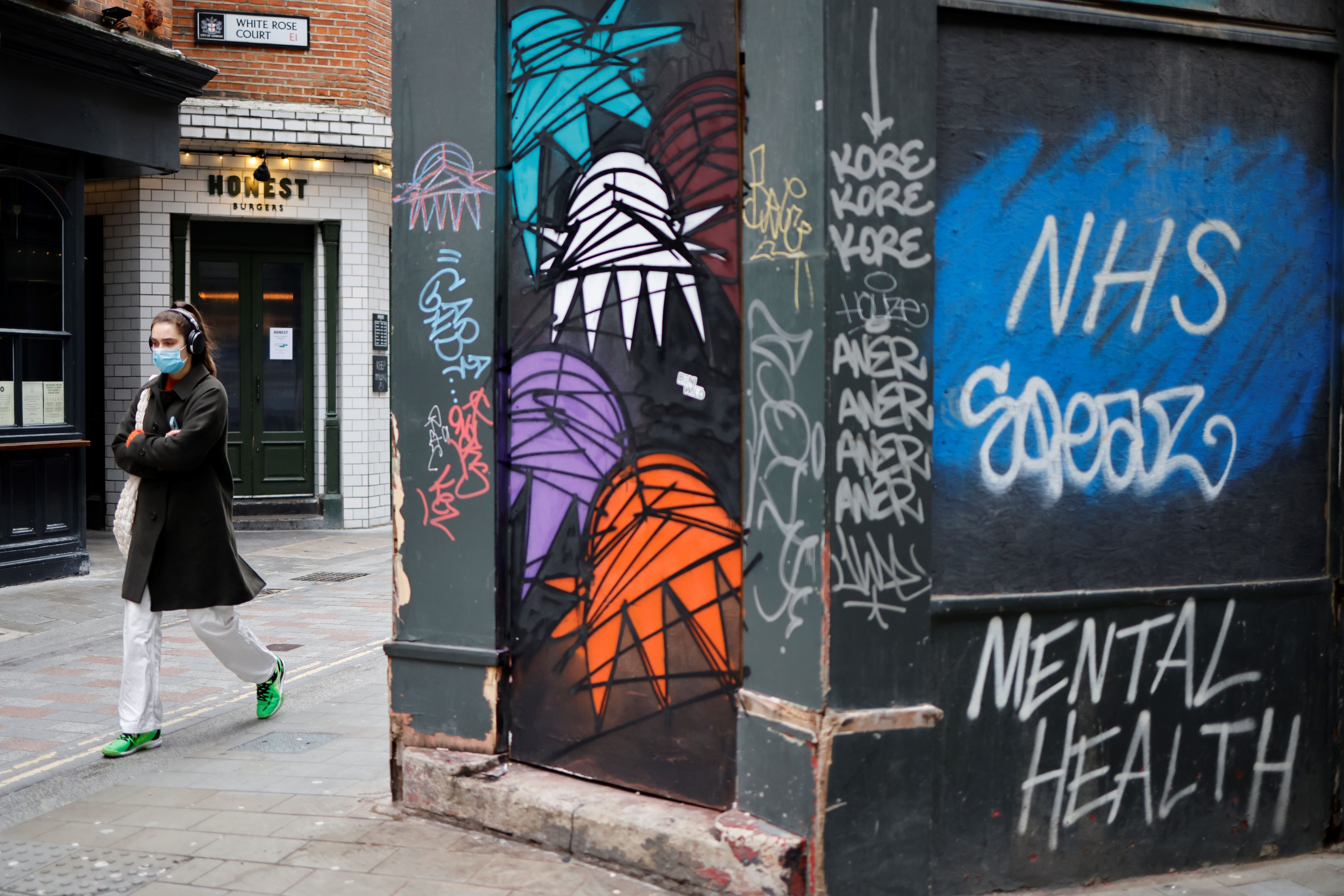One year of lockdown: Women reveal uniquely devastating ways pandemic has ravaged their lives
From surging domestic abuse to women being more likely to lose jobs, Maya Oppenheim speaks to women across the UK on how the last year has changed their lives


Your support helps us to tell the story
From reproductive rights to climate change to Big Tech, The Independent is on the ground when the story is developing. Whether it's investigating the financials of Elon Musk's pro-Trump PAC or producing our latest documentary, 'The A Word', which shines a light on the American women fighting for reproductive rights, we know how important it is to parse out the facts from the messaging.
At such a critical moment in US history, we need reporters on the ground. Your donation allows us to keep sending journalists to speak to both sides of the story.
The Independent is trusted by Americans across the entire political spectrum. And unlike many other quality news outlets, we choose not to lock Americans out of our reporting and analysis with paywalls. We believe quality journalism should be available to everyone, paid for by those who can afford it.
Your support makes all the difference.A year ago this week, when the UK was catapulted headfirst into a national lockdown, few bar the occasional naysayer and epidemiologist envisaged how much their lives would be turned upside down, perhaps forever.
And it now appears clear that women have borne the brunt or the repercussions of the Covid chaos.
From soaring rates of domestic abuse to giving birth alone, there are a plethora of ways women have been hard hit by the crisis. They have also been more likely to lose jobs or be furloughed due to being over-represented in low-paid precarious jobs and sectors hit hardest by the pandemic, such as hospitality, retail, leisure, tourism and the arts.
The Independent has spoken to some of those women who have struggled as our lives have changed in ways that would have appeared inconceivable before the pandemic.
The unplanned pregnancy
The public health crisis has massively disrupted the NHS as services that provide contraception for women have been profoundly affected by Covid upheaval.
Sexual health clinics have been forced to shut or run reduced services while staff are transferred to work with Covid patients or have to self-isolate, with the disruption leaving many women unable to access their usual methods of contraception.
Many women are struggling to get the most effective long-acting contraceptive choices of a coil or an implant due to these needing in-person appointments which have largely been suspended as consultations are conducted via phone or video call to stop coronavirus spreading.
The Independent previously reported thousands of women have had abortions after falling pregnant while having difficulties accessing contraception during the pandemic.
Megan Davenport, a 22-year-old who lives in Sheffield, had to have an abortion after getting pregnant in the middle of the pandemic. Her unexpected pregnancy came amid concerns that she would be able to secure contraception during the ongoing pandemic, she said.
Read more:
- ‘He was carrying two knives looking for me’: Women cooped up with violent partners during lockdown recount horror
- ‘I am scared to go into the garden’: Stalking victims reveal horror of lockdown as reports rise
- ‘Not a single soul who cared’: Forgotten new mothers recall trauma of giving birth in pandemic
Ms Davenport, who studies science communications, said: “I was quite paranoid about wanting to take pressure off the NHS. I also had heard a lot of stories about contraception during lockdown.
“Friends talked about paying for pills online. I am a student, so I don’t have a lot of money. I didn’t want to pay for something I’d previously got for free. I now know you can obviously get them for free on the NHS. At the time I thought I can’t be bothered trying just in case these services aren’t up and running.
“To cut a long story short, I had an after lockdown hook up with a good friend of mine. It was one hook up and I accidentally got pregnant. I had a freak out. I got in touch with the British Pregnancy Advisory Service and they sent me abortion pills through the post.”
Ms Davenport said it was overwhelming discovering she was pregnant and then having an abortion in the middle of a pandemic, but noted the British Pregnancy Advisory Service made her feel “safe and supported”.

She added: “It felt kind of scary. A lot happened at once. The actual abortion was very painful. It was literally the worst pain of my life. It is excruciating stomach pain. Kind of like extreme period pains. It feels like a big build-up of pain which you need to release but can’t.
“I don’t want to sound unemotional, but the abortion wasn’t a traumatic thing. It just felt like any medical care really. It would have been very traumatic having to have a baby.”
She said she had heard of women struggling to get contraceptive coils fitted at the start of the coronavirus crisis due to them requiring face-to-face appointments – adding that she has currently been on the waiting list to have a coil fitted for roughly six months.
The stalking victim
In the same way, domestic abuse has soared in the lockdown, stalking has also surged. The Independent recently revealed calls to the National Stalking Helpline increased by 11 per cent in the public health emergency, with the Suzy Lamplugh Trust, which runs the helpline, warning stalkers appear to have ramped up frequency and intensity.
Callers dealt with almost 18,000 calls from March 2020 until February this year, up from the just over 16,000 calls the stalking helpline received in the same period a year earlier.
“It has been three years of stalking,” Lucy*, a stalking victim whose situation has been compounded by the pandemic tells The Independent. “He vandalised my friend’s car.”
The 59-year-old, who cannot have her identity revealed to protect her safety, says her stalker was not able to vandalise her own home as she lives in a flat in a gated community with heavy CCTV presence.
Lucy, who is taking legal proceedings against her stalker, adds: “He would spend his entire time waiting at the bottom of my road and circle my place of work. I would see him several times a day.
“It’s everybody's nightmare to experience that level of malice and hostility and fixation from someone. He has got absolutely nothing in his life apart from me. Nothing apart from his rage and hatred against me.
“I saw him yesterday while I was driving. I thought with the pandemic he’d be off the streets, but every single day for the last year he’s parked in this area and walked about.
“He sent me a death threat saying he knew exactly which flat I lived in. Previously he had a routine but lockdown has certainly isolated him. But he is not capable of staying home. Legally, he can’t go out, which adds to his aggravation. He has more energy to fixate on me.”
The woman hit by financial fallout
Numerous studies have suggested the Covid crisis is on course to reverse progress on gender equality due to women being hardest hit by the financial repercussions of the pandemic as they are more likely to work in locked down sectors.
While a recent report found women are twice as likely to need time off work with no pay to look after children due to schools closing under lockdown measures, other studies have revealed women have shouldered the burden of childcare, household chores and homeschooling.
Gemma Hirst, who lost the retail job she had been in for six years in the summer, has first-hand experiences of the recession.
The 26-year-old, who lives in Northumberland, says: “I got promoted just before lockdown happened. Things were definitely going up. There was nothing to worry about until Covid.
“At first I felt okay because I was on furlough. In the summer – June or July time – there were rumours, emails and phone calls about the risk of job losses. I was offered a job at another store but it was considerably less money.
“It was a different job with a different contract so I had to take redundancy. We had a conference video call. I cried. It was rather embarrassing. I did not expect I’d be affected because I’d worked there for six years at management level.
“I went on Universal Credit. Still on it now. It is not enough money. I’m lucky I live with my family. It is not nice not earning your own keep. I did have a good couple of weeks where I felt rubbish and really low. You feel worthless.
“The fact more women than men have lost their jobs in the pandemic infuriates me, especially in 2021, we should be treated equally. The government should be doing more help to women but why would they? It doesn’t affect them. They're not bothered.”

The woman who escaped domestic abuse in lockdown
Domestic violence has surged during the Covid emergency – in May, it emerged calls to the UK’s national domestic abuse helpline had risen by 66 per cent and visits to the sister website soared by 950 per cent since the nation locked down.
A report released by MPs at the end of April last year revealed domestic abuse killings in the first 21 days of the first lockdown were double the total of an average period in the past decade. On top of this, previous research by leading domestic abuse charity Women’s Aid found one in seven victims currently enduring abuse at the hands of their partners said it had got worse in the wake of the health emergency.
Daisy* has direct experience of pre-existing patterns of domestic abuse escalating in lockdown – and said being cooped up at home with her perpetrator exacerbated an already dangerous situation.
The 30-year-old, whose name has been changed to protect her safety, said: “He perpetrated essentially any type of abuse you can imagine. Sexual, physical, mental, financial. All of it. I think it is rare for someone to be abused in only one way.
“Lockdown increased all of the issues that were already there. After lockdown, I became the only person my ex was physically around. Previously, I had been able to escape in the hours we spent away from each other; now he could always reach me.”
Daisy, who previously lived in the Midlands but escaped from her ex-partner by moving abroad last spring, said the abuse she has suffered has had a damaging impact on her mental health.
“The abuse increased the terrible self-image I already had. Gaslighting and manipulation were everyday occurrences. I believed my ex, that I was not worth anything more than what I was getting,” she said.
“I have had to work harder than I ever have in my life to overcome that belief. I think there will be issues I may always have to cope with, like PTSD, but due to some incredibly hard work in therapy and being on my own now, the coping is not as difficult. I am grateful for the life I have now, every day.”
Daisy, who was helped by Women's Aid, said she still has nightmares about her ex but less than she did before and her role in the dreams has now changed.
“Dream-me handles herself better than before,” Daisy said. “But I would not be surprised if the nightmares stayed forever”.
*Names have been changed to protect identities
Join our commenting forum
Join thought-provoking conversations, follow other Independent readers and see their replies
Comments